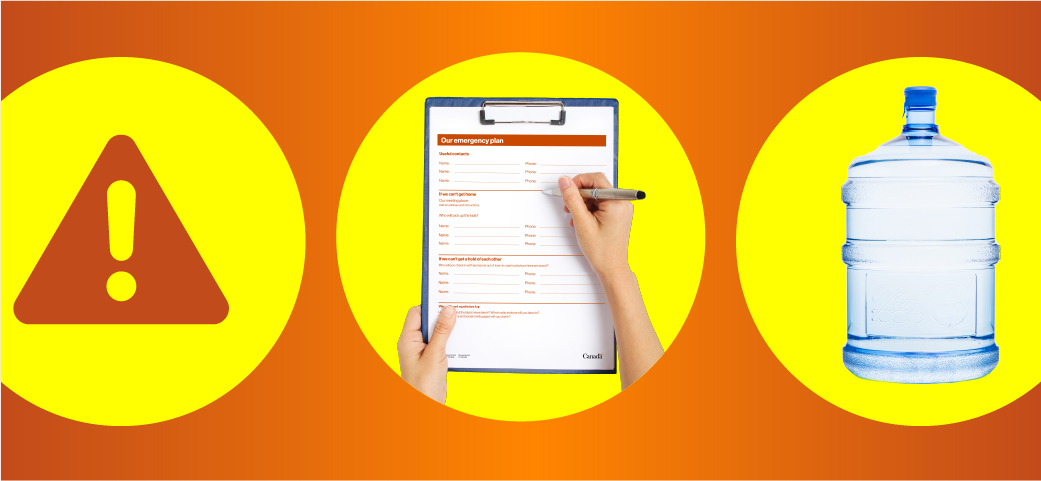Get prepared
Emergencies can happen at any time and without warning. Be ready. With a little preparation, you can respond quickly to help yourself and others. Understand the risks in your area, create a household emergency plan and build an emergency kit.
Emergency planning
Make an emergency plan
A household emergency plan helps you to act quickly, stay connected, and reduce stress when it matters most.
Making an emergency kit
An organized emergency kit ensures you have what you need and you can find it fast. Keep it portable, accessible, and make sure everyone knows where it is.
Emergency planning resources
Household emergency plans, emergency preparedness for children, pets and service animals, staying connected in emergencies.
Types of hazards and emergencies
Weather-related hazards
Floods, hurricanes, tornadoes, winter storms, fog, hail and more
Climate and environmental hazards
Droughts, extreme heat and cold, wildfires and permafrost degradation
Earth and space hazards
Earthquakes, tsunamis, landslides, avalanches, space weather and volcanoes
Public health and safety hazards
Bomb threats, suspicious packages and pandemic preparedness
Technology and infrastructure hazards
Cyberattacks, power outages, hazardous material releases, and radiological and nuclear emergencies
Full list of hazards
View the full list of hazards that may occur in Canada, from natural hazards to cyber and health threats
Transcript/Captions
[A family sits in their living room watching TV.]
Weather announcer: And some nasty weather rolling in across the country today…
[The TV shows people walking outside in a storm. The news ticker on the TV reads: "Breaking news: Heavy snowfall warnings across Canada".]
Narrator: Extreme weather can hit quickly.
[Grandpa looks up from his crossword at the TV.]
Narrator: Because of climate change, high-risk weather is becoming more common and severe across Canada.
[The TV shows extreme high winds and reads: "Hurricane makes landfall".]
[Dad and Mom look at each other, concerned.]
[The TV shows a series of extreme weather events. The ticker now reads: "Flood waters rapidly rising".]
Narrator: 1 in 3 Canadian adults have experienced a major weather-related emergency or disaster.
[Daughter looks at the TV with wide eyes and drops her coloured pencil.]
[The TV shows a severe thunderstorm. The camera pans to show that the storm is now happening outside the family's window. Thunder claps.
The family is no longer in the living room.]
Narrator: Know the risks in your area and learn what actions you can take.
[Cut to the kitchen. Mom runs her finger down an Emergency Checklist attached to the fridge.]
[Dad checks the kitchen cupboards for emergency supplies.]
Narrator: Are you ready?
[Dad sets two jugs of water on the kitchen island. Mom brings out a first aid kit.]
Narrator: Visit GetPrepared.ca.
[The family sits around the island. Onscreen text: GetPrepared.ca]
Narrator: A message from the Government of Canada.
[Canada wordmark]
Extreme weather can hit quickly. Are you ready?
1 in 3 Canadian adults have experienced a major weather-related emergency or disaster in their lifetime. Know the risks in your area and learn what actions you can take.
Emergency Preparedness Week
About Emergency Preparedness Week
Emergency Preparedness (EP) Week is a national awareness initiative and an opportunity for you to take action to ensure you're prepared to protect yourself, your household and your community during an emergency.
Emergency Preparedness Week Toolkit
Graphics, social media content and more information to build your EP Week
Features
Wildfire response
Government of Canada emergency wildfire response, support, and recovery measures
Flooding response
Government of Canada emergency flood response, support, and recovery measures
Flood ready
Floods are among the most frequent and costly natural disasters in Canada. Take steps to protect your property




